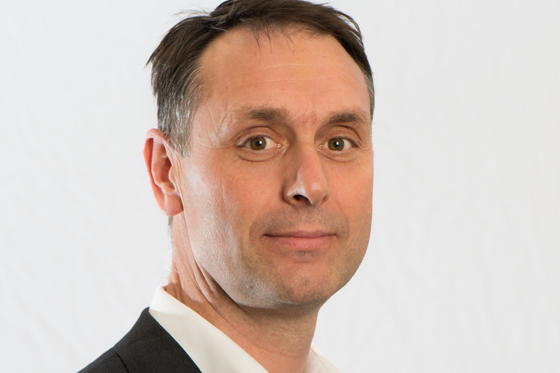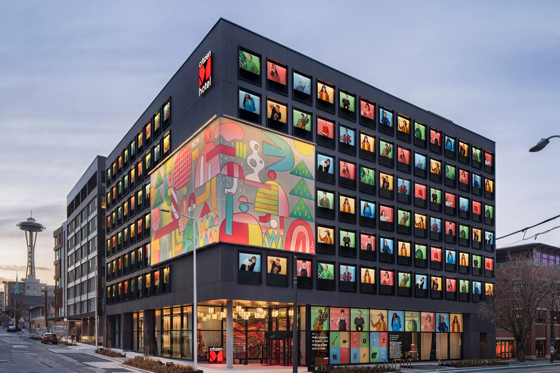When CitizenM CEO Klaas van Lookeren Campagne stared down the COVID-19 crisis in March, he stated, “Let’s go come out with a better product, not less. Let’s give guests more.” Today, he says, that point of view is still driving his personal agenda as he presides over the 20 owned and operated hotels in eight countries.
Despite the pandemic, there are still another 21 properties under active development, including a recently announced 240-room hotel adjacent to Facebook Inc.’s headquarters in Menlo, California. In July, CitizenM also signed a deal with Germany’s largest hotel developer, GBI, to search for multiple new locations in Munich, Hamburg, Frankfurt and Berlin. In May 2020, the brand opened its fourth hotel in the United States and first on the West Coast – Seattle South Lake Union. Openings are scheduled for autumn of this year in Washington, D.C., and Geneva, Switzerland.
One of the 2008 founders of the Dutch lodging brand along with Rattan Chadha, Campagne took over as CEO two years ago after directing KRC Capital, a lifestyle-focused private equity firm he founded with Chadha. He previously was in charge of the real estate corporate finance team specializing in hospitality and leisure at Deloitte.
With plans to double the CitizenM footprint in five years, he is now charged with delivering high profitability per square meter, which, in turn, allows the brand to develop “affordable luxury for the people” on prime locations in cities with the highest barriers to entry. He is also chairman of the investment committee and acts as chief investment officer responsible for the growth strategy of all investments, and the management of the CitizenM portfolio.

HOTELS recently spoke with Campagne to better understand how he is delivering on his agenda, as well as find out how he and his teams are doing.
HOTELS: How are you personally managing through the crisis?
Klaas van Lookeren Campagne: My heart really cries when I see this happening and that it is still there. It is hard to say that I am doing good when my heart is crying for the business, and crying for the people in great pain… Nevertheless, I have always liked being out of my comfort zone, and this is placing everybody out of the comfort zone… I’m really proud of our company because we started 15 years ago putting everybody out of their comfort zone. We went into a venture with absolutely zero hotel experience. We are in a similar environment today where you have to completely step out of your normal routine and be creative again. It’s a very interesting challenge as you have no clue how this is going to unfold with almost no control. It is very uncomfortable, but I can really handle it.
H: As a result of COVID-19, what are you doing to balance your life and work habits?
KLC: I have been traveling in the past 25 years extensively. To get a break, personally, that is fantastic because I see my three girls more… Personally, I gained so much time… I can work everywhere and have the ability to switch on and switch off whenever I like. So, I can talk to my girls and, one second later, I can be on email again or in a Zoom meeting.
H: What were some of the initial decisions taken to operate through this situation?
KLC: First, we got control over the business again because all of our guests were gone. We had to make instant decisions, and I think we were the first company to offer free cancellations. No matter what the contract says, give them back their money. We had negative net figures for many days because millions were going out of the door in cancellations.
I also knew immediately that meeting my covenants for my bank in 12 months would be a difficult. Within a month, we had all of our bank waivers in place. I learned from the previous financial crisis to move quickly.
We also went to our shareholders immediately to tell them this is going to create a massive loss, and we need your support. We were able to do our audits, which is strange, in the normal timing. We got our financial accounts approved because we had all those things in place.
H: How long are your waivers with the banks?
KLC: Eighteen months. We wanted 24 but we didn’t get it… We have a simple structure. We own all of our assets, so it’s not that complicated.
H: What else did you do in the first phase of the crisis?
KLC: We moved to weekly cash flow forecast meetings with our board and all of our banks. They got all our information, so we became immediately very transparent. We did that for a period of a month or six weeks, and then we said, ‘Let’s now move to monthly meetings.’ That gave everyone so much confidence. That information is shared throughout the company.
We also immediately took the position that we don’t want to fire our staff. We don’t want furloughs. We don’t believe in that. We calculated the cost for our shareholders and they immediately agreed. It was not a difficult discussion with our shareholders.
We did an investigation into what is actually cheaper, to close the hotels or keep them open. We already have a reduced staffing model and for safety you need a presence in your hotels even if you’re closed. We found that, actually, in our business model, it really didn’t make a difference. Our strategy was to keep them open – unless we were forced by local regulations to close them.

H: What else did you prioritize?
KLC: We already went full contactless. We really wanted guests to be able to check in via their phones and open guest room doors with their phones. Those things have already been solved.
In a fast-growing company, you always have a backlog of projects. We immediately said, ‘Let’s speed up the whole digital process, and let’s focus on how can we improve the guest experience – not only during COVID or the recovery, but really for the long term.’ We asked our shareholders for incremental investments, and we invested quite substantially to fast track those, and that is what the teams have been working on.
…We already had the idea of opt-in housekeeping. Most business people, actually, if they’re with us for two, three nights, they don’t even want their rooms cleaned. Why would they? This was, for us, the opportunity to immediately execute it… The decision was not made out of savings. The decision was really made out of, ‘is this what the guests want?’ We really believed all the guests are looking for this. Now, in COVID, they like it; but also post-COVID they’ll like it… We have our housekeeping outsourced, and we are in the middle of renegotiating contracts on this basis.
Another one that also had been on our list for a very long time: F&B ordering through the app. It’s very complicated to digitize fully but it’s absolutely what we are going to do… It is always easier to do it for a guest, but the back end will take longer. We can work around it…
But in the next three months, most of the claims that we are making will really be there portfolio-wide. For the back office, that will take longer.
We also want to try to positively influence our channel mix to get more direct business. I said, ‘All the travel managers are not sitting at home. What are they doing? Let’s call them.’ We organized focus groups with our core corporate customers to find out what they want different. We really asked and listen to them.
The feedback they gave us: ‘You are the only hotel chain that is really interacting with us.’ No surprise because a lot of the other hotel chains have furloughed. We really connected to our guests, both the corporate and our private guests, sending them emails. We also decided not to send them so much information on how good we are cleaning because it will never bring them to us. If they can’t travel, they can’t travel, but we can have interactions with them. We can say we miss you in a sincere way. That’s what we have been doing…
We knew what he would get, so it is more about the interaction. Can you convince them and lure them to do more direct businesses? What is it then that they need? We are now working on referral programs and subscription programs…
Facebook is telling their employees to work from remote places. So, we approached them, of course. What does that mean? Your employees need to work somewhere. Do you want them to work in our lobbies? Do you want subscriptions so they can really consume guest rooms, meeting rooms. You find interesting discussions that they’re absolutely willing to explore… I think all those interactions will strengthen our direct relationships with our core customers.
(Note: On Tuesday, CitizenM launched two corporate subscription programs. Corporate Subscription by CitizenM offers unlimited monthly use of any CitizenM hotel living room, as well as three overnight stays, use of SocietyM meeting rooms, and the ability to add more nights or meeting room hours at a 10% discount. Its Global Passport by CitizenM offers a fixed-rate stay option that allows users to choose on a monthly basis where they want to live or work for the cost of less than a month’s rent.)
H: How do you see the hotel business shaking out in the near term?
KLC: CitizenM started during the last financial crisis and it is a bit of a blessing. That really shaped the mentality of the company and that is what I am constantly telling the team – concentrate on what we can control. I can give my team assurance that they will have a job. We will get through this, and that is a lot. We will have fun again, but it will not be 2019 for a very long time… I plan quarter by quarter, and I take my actions quarter by quarter. It doesn’t really make sense to ask me what I’ll be doing in ‘23. I won’t change my course. We continue to grow. We continue to focus on pleasing our guests to our best ability, and then we hope, of course, for the best.
What will happen to the industry? It will be shakeout at some point. It definitely will be. Is that bad? No, it’s not bad. I think governments should not support hotel chains… For some people, that will be painful, but I think it is inevitable. It is part of the ecosystem that we created. We are lucky that we can still do it, but not without pain.

